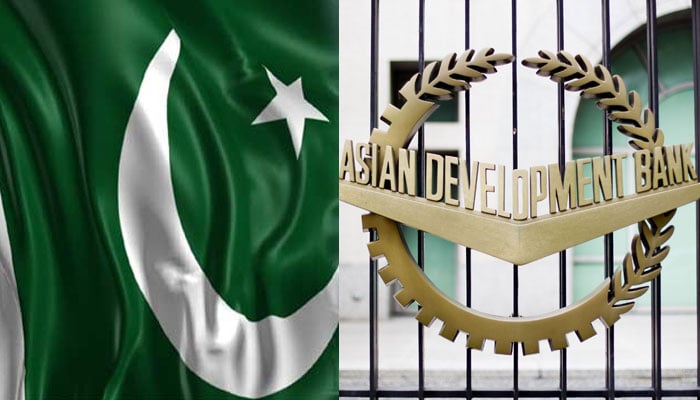ADB approves 70pc increase in loan allocation for Pakistan
“ADB will provide $2.5 billion in approved financing to Pakistan in 2019, and recently approved country operations business plan 2020-2022 will increase average lending to $2.4 billion a year - a record increase over the $1.4 billion average from 2015 to 2018,” the ADB said in a tweet.
ISLAMABAD: Asian Development Bank (ADB) on Wednesday approved around 70 percent increase in its loan quota for Pakistan to $7.1 billion for the next three years to help the country meet its development goals in various economic sectors.
Manila-based lender previously earmarked $4.2 billion under its country operation business plan 2020-2022.
“ADB will provide $2.5 billion in approved financing to Pakistan in 2019, and recently approved country operations business plan 2020-2022 will increase average lending to $2.4 billion a year - a record increase over the $1.4 billion average from 2015 to 2018,” the ADB said in a tweet.
“In addition, ADB will leverage lending through the mobilisation of co-financing and funding from other sources, including regional concessional resources. The new COBP will support Pakistan’s development goals and complement efforts by other development partners.”
The proposed sovereign lending comprises $5.6 billion from regular ordinary capital resources (OCR) lending and $1.5 billion from concessional OCR loan, including about 25 percent over-programming to respond to possible operational adjustments.
The non-lending program for 2020–2022 is $22 million inclusive of ADB and other sources, majority of which are transaction technical assistance for several pipeline projects.
ADB said the pipeline includes policy- and results-based loans, and multi-tranche financing facility (MFF) to supplement the government’s energy reform agenda. The projects would strengthen energy infrastructure, particularly in transmission, distribution, and gas, increase the supply of affordable indigenous energy and provide capacity development support.
The fourth tranche of the MFF for power transmission investment program slipped from 2019 to 2020 and a new project (Balakot hydropower development) for 2020 has been included.
ADB said it would support the construction and rehabilitation of national and provincial highways to improve regional connectivity, transport efficiency, and road safety, with a focus on upgrading Central Asia Regional Economic Cooperation corridors.
“The national highway project from 2019 pipeline is now firm in 2021 and new projects for 2022 will focus on provincial and rural road development,” ADB said in a report.
ADB said it supports targets of improved irrigation and water resource and agricultural market development. New projects under the three-year strategy include the Punjab agriculture markets development and the Dera Ghazi Khan canal irrigated agriculture improvement projects and climate policy sector development program.
ADB’s urban program focuses on water, drainage, sanitation, solid waste, mass transit, urban governance, and smart city initiatives. New projects, under the three-year strategy, are Khyber Pakhtunkhwa livable cities sustainable development and Punjab livable cities sustainable development programs, and the sustainable urban mobility project in Khyber Pakhtunkhwa.
New projects related to finance and public sector management include policy-based loans for finance sector reforms and public-private partnership projects in Sindh and Punjab. ADB is likely to process ‘urgent’ assistance of $1 billion under the special policy-based lending modality and additional financing of $200 million for the Benazir Income Support Program.
The strengthening of Khyber Pakhtunkhwa health systems project has also been included in 2021 pipeline. For next year, technical assistances for the health insurance financing and preparation of education projects in Sindh and Punjab have been planned.
ADB would also provide $350 million for multi-sector projects, including the multi-sector development and initiatives for Khyber Pakhtunkhwa and an integrated social protection development program.
-
 Horrifying Pictures Of The Kidnapper Of Savannah Guthrie's Mother Released
Horrifying Pictures Of The Kidnapper Of Savannah Guthrie's Mother Released -
 Andrew's Ex-girlfriend Launches Brazen Attack On Epstein Victims On Piers Morgan Show
Andrew's Ex-girlfriend Launches Brazen Attack On Epstein Victims On Piers Morgan Show -
 Andrew Mountbatten-Windsor 'on His Own' As Palace Gives Green Light To Law Enforcement
Andrew Mountbatten-Windsor 'on His Own' As Palace Gives Green Light To Law Enforcement -
 Kanye West's Tweet About Super Bowl Halftime Resurfaced After Bad Bunny's Show
Kanye West's Tweet About Super Bowl Halftime Resurfaced After Bad Bunny's Show -
 'FBI' Star Juliana Aidén Martinez Tease Her Return To 'Law And Order: SVU' After Quitting
'FBI' Star Juliana Aidén Martinez Tease Her Return To 'Law And Order: SVU' After Quitting -
 Cardi B's Emotional Words To Pal Amid Stefon Diggs Rumored Breakup Revealed
Cardi B's Emotional Words To Pal Amid Stefon Diggs Rumored Breakup Revealed -
 Princess Eugenie Breaks Cover Amid Explosive Family Scandal
Princess Eugenie Breaks Cover Amid Explosive Family Scandal -
 Will Kate And Anthony Have 'Bridgerton' Spin Off? Revealed
Will Kate And Anthony Have 'Bridgerton' Spin Off? Revealed -
 Schoolgirl Eaten Alive By Pigs After Brutal Assault By Farmworker
Schoolgirl Eaten Alive By Pigs After Brutal Assault By Farmworker -
 King Charles’ Statement About Epstein Carries A Secret Meaning: Here’s Why It Can Be An Invite To Police
King Charles’ Statement About Epstein Carries A Secret Meaning: Here’s Why It Can Be An Invite To Police -
 Demi Lovato Delivers Heartbreaking Message To Fans About Her Concerts
Demi Lovato Delivers Heartbreaking Message To Fans About Her Concerts -
 Sweden's Princess Sofia Explains Why She Was Named In Epstein Files
Sweden's Princess Sofia Explains Why She Was Named In Epstein Files -
 Activist Shocks Fellow Conservatives: 'Bad Bunny Is Winner'
Activist Shocks Fellow Conservatives: 'Bad Bunny Is Winner' -
 Noel Gallagher Challenges Critics Of Award Win To Face Him In Person
Noel Gallagher Challenges Critics Of Award Win To Face Him In Person -
 Minnesota Man Charged After $350m IRS Tax Scam Exposed
Minnesota Man Charged After $350m IRS Tax Scam Exposed -
 Meghan Markle 'terrified' Over Possible UK Return
Meghan Markle 'terrified' Over Possible UK Return




